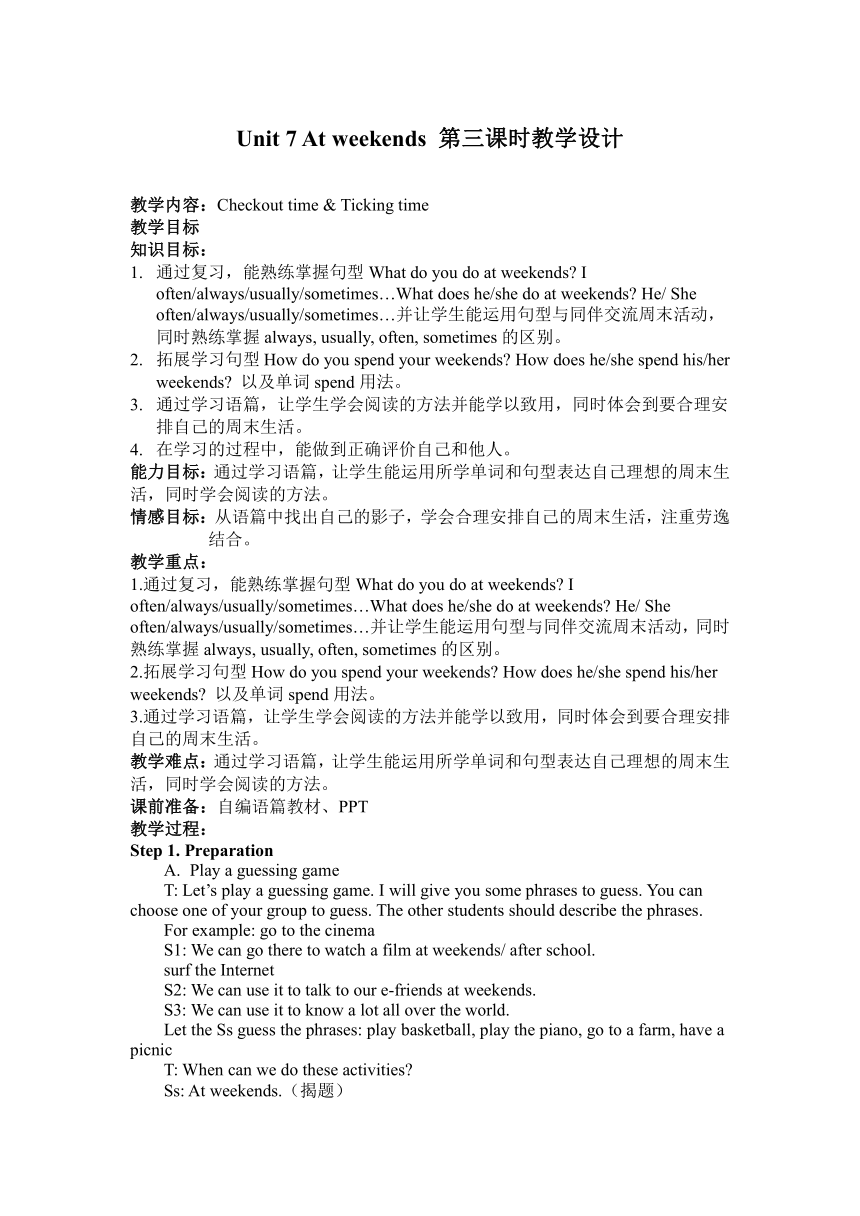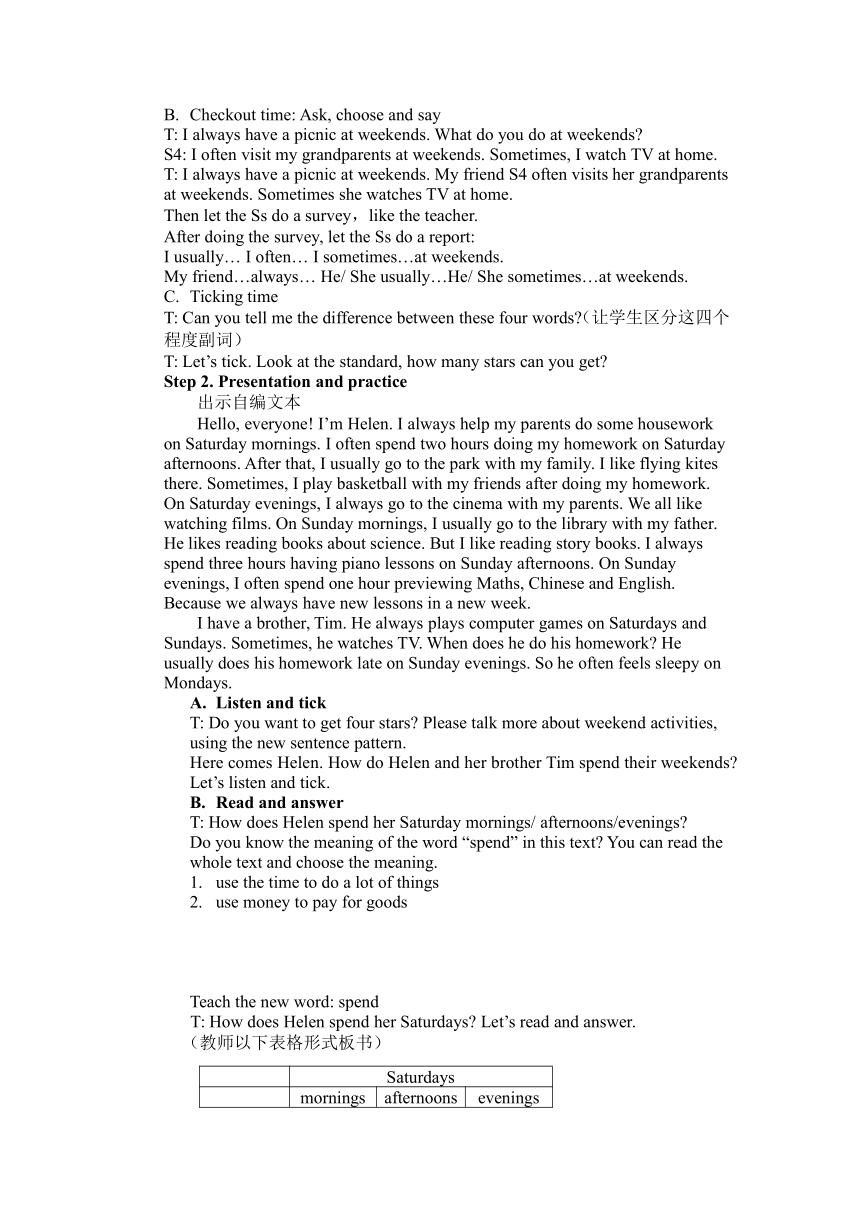Unit 7 At weekends Checkout time & Ticking time 教案
文档属性
| 名称 | Unit 7 At weekends Checkout time & Ticking time 教案 |

|
|
| 格式 | docx | ||
| 文件大小 | 24.4KB | ||
| 资源类型 | 教案 | ||
| 版本资源 | 牛津译林版 | ||
| 科目 | 英语 | ||
| 更新时间 | 2021-12-05 00:00:00 | ||
图片预览


文档简介
Unit 7 At weekends 第三课时教学设计
教学内容:Checkout time & Ticking time
教学目标
知识目标:
通过复习,能熟练掌握句型What do you do at weekends I often/always/usually/sometimes…What does he/she do at weekends He/ She often/always/usually/sometimes…并让学生能运用句型与同伴交流周末活动,同时熟练掌握always, usually, often, sometimes的区别。
拓展学习句型How do you spend your weekends How does he/she spend his/her weekends 以及单词spend用法。
通过学习语篇,让学生学会阅读的方法并能学以致用,同时体会到要合理安排自己的周末生活。
在学习的过程中,能做到正确评价自己和他人。
能力目标:通过学习语篇,让学生能运用所学单词和句型表达自己理想的周末生活,同时学会阅读的方法。
情感目标:从语篇中找出自己的影子,学会合理安排自己的周末生活,注重劳逸结合。
教学重点:
1.通过复习,能熟练掌握句型What do you do at weekends I often/always/usually/sometimes…What does he/she do at weekends He/ She often/always/usually/sometimes…并让学生能运用句型与同伴交流周末活动,同时熟练掌握always, usually, often, sometimes的区别。
2.拓展学习句型How do you spend your weekends How does he/she spend his/her weekends 以及单词spend用法。
3.通过学习语篇,让学生学会阅读的方法并能学以致用,同时体会到要合理安排自己的周末生活。
教学难点:通过学习语篇,让学生能运用所学单词和句型表达自己理想的周末生活,同时学会阅读的方法。
课前准备:自编语篇教材、PPT
教学过程:
Step 1. Preparation
Play a guessing game
T: Let’s play a guessing game. I will give you some phrases to guess. You can choose one of your group to guess. The other students should describe the phrases.
For example: go to the cinema
S1: We can go there to watch a film at weekends/ after school.
surf the Internet
S2: We can use it to talk to our e-friends at weekends.
S3: We can use it to know a lot all over the world.
Let the Ss guess the phrases: play basketball, play the piano, go to a farm, have a picnic
T: When can we do these activities
Ss: At weekends.(揭题)
Checkout time: Ask, choose and say
T: I always have a picnic at weekends. What do you do at weekends
S4: I often visit my grandparents at weekends. Sometimes, I watch TV at home.
T: I always have a picnic at weekends. My friend S4 often visits her grandparents at weekends. Sometimes she watches TV at home.
Then let the Ss do a survey,like the teacher.
After doing the survey, let the Ss do a report:
I usually… I often… I sometimes…at weekends.
My friend…always… He/ She usually…He/ She sometimes…at weekends.
Ticking time
T: Can you tell me the difference between these four words (让学生区分这四个程度副词)
T: Let’s tick. Look at the standard, how many stars can you get
Step 2. Presentation and practice
出示自编文本
Hello, everyone! I’m Helen. I always help my parents do some housework on Saturday mornings. I often spend two hours doing my homework on Saturday afternoons. After that, I usually go to the park with my family. I like flying kites there. Sometimes, I play basketball with my friends after doing my homework. On Saturday evenings, I always go to the cinema with my parents. We all like watching films. On Sunday mornings, I usually go to the library with my father. He likes reading books about science. But I like reading story books. I always spend three hours having piano lessons on Sunday afternoons. On Sunday evenings, I often spend one hour previewing Maths, Chinese and English. Because we always have new lessons in a new week.
I have a brother, Tim. He always plays computer games on Saturdays and Sundays. Sometimes, he watches TV. When does he do his homework He usually does his homework late on Sunday evenings. So he often feels sleepy on Mondays.
Listen and tick
T: Do you want to get four stars Please talk more about weekend activities, using the new sentence pattern.
Here comes Helen. How do Helen and her brother Tim spend their weekends Let’s listen and tick.
Read and answer
T: How does Helen spend her Saturday mornings/ afternoons/evenings
Do you know the meaning of the word “spend” in this text You can read the whole text and choose the meaning.
use the time to do a lot of things
use money to pay for goods
Teach the new word: spend
T: How does Helen spend her Saturdays Let’s read and answer.
(教师以下表格形式板书)
Saturdays
mornings afternoons evenings
always
usually
often
sometimes
T: Please read and underline the key sentences,it can help you find the
answers.
(教师出示阅读方法)
S5: On Saturday mornings, Helen always helps her parents do some housework.
S6: On Saturday afternoons, she often spends two hours doing her homework.
T: There are twenty-four hours in a day. One hour equals sixty minutes.(教授单词hour)
S7: After that, she usually goes to the park with her family.
S8: Sometimes, she plays basketball with her friends.
S9: She always goes to the cinema with her parents on Saturday evenings.
Learn in your groups
Let the Ss read and answer
让学生仿照教师处理文本的方式,小组内运用句型How does Helen spend
her Sundays 进行组内学习,教师出示小组合作学习方法:先在组内齐读
文本,然后自读划出关键句,最后组内一人问几人答。教师结合学生的
答案用以下表格形式板书
Sundays
mornings afternoons evenings
always
usually
often
sometimes
在校对答案的过程中,教师教授单词preview
T: Let’s read and choose the meaning of this word “preview”
1. study before the lessons
2. study after the lessons
让学生运用猜测单词spend的用法,进行猜测preview的词义并学习
D. Find and say
T:Look at these sentences, can you find the usage of the word “spend”
S10: spend doing...
T: Can you use the phrase to say more sentences (让学生运用此词组说句子)
E. Read and judge
T: How does Tim spend his weekends
Let the Ss read by themselves and judge these sentences.
Tim always plays computer games at weekends.
Tim sometimes plays football with his friends at weekends.
Tim sometimes does his homework late on Sundays.
T: Do you remember the reading way
让学生运用老师教授的阅读方法进行阅读判断
Step 3. Production and progress
Let’s name
T: Can you give the name about Helen’s weekends
______ weekends
T: How about Tim’s weekends ______weekends
What do you want to say to Tim
Let’s write
T: Helen has colorful weekends. We should learn from her. What’s your ideal weekend How do you spend your weekends Let’s write in groups.
Step 4. Homework
Write your own ideal weekend, using the new word “spend”.
Blackboard design:
Unit 7 At weekends
How does Helen/ Tim spend his/ her weekends
He/ She…
Helen: _______ weekends
Saturdays Sundays
mornings afternoons evenings mornings afternoons evenings
always
usually
often
sometimes
Tim: ______weekends
always plays computer games
sometimes watches TV
usually does his homework late on Sunday evenings
often feels sleepy on Mondays
教学内容:Checkout time & Ticking time
教学目标
知识目标:
通过复习,能熟练掌握句型What do you do at weekends I often/always/usually/sometimes…What does he/she do at weekends He/ She often/always/usually/sometimes…并让学生能运用句型与同伴交流周末活动,同时熟练掌握always, usually, often, sometimes的区别。
拓展学习句型How do you spend your weekends How does he/she spend his/her weekends 以及单词spend用法。
通过学习语篇,让学生学会阅读的方法并能学以致用,同时体会到要合理安排自己的周末生活。
在学习的过程中,能做到正确评价自己和他人。
能力目标:通过学习语篇,让学生能运用所学单词和句型表达自己理想的周末生活,同时学会阅读的方法。
情感目标:从语篇中找出自己的影子,学会合理安排自己的周末生活,注重劳逸结合。
教学重点:
1.通过复习,能熟练掌握句型What do you do at weekends I often/always/usually/sometimes…What does he/she do at weekends He/ She often/always/usually/sometimes…并让学生能运用句型与同伴交流周末活动,同时熟练掌握always, usually, often, sometimes的区别。
2.拓展学习句型How do you spend your weekends How does he/she spend his/her weekends 以及单词spend用法。
3.通过学习语篇,让学生学会阅读的方法并能学以致用,同时体会到要合理安排自己的周末生活。
教学难点:通过学习语篇,让学生能运用所学单词和句型表达自己理想的周末生活,同时学会阅读的方法。
课前准备:自编语篇教材、PPT
教学过程:
Step 1. Preparation
Play a guessing game
T: Let’s play a guessing game. I will give you some phrases to guess. You can choose one of your group to guess. The other students should describe the phrases.
For example: go to the cinema
S1: We can go there to watch a film at weekends/ after school.
surf the Internet
S2: We can use it to talk to our e-friends at weekends.
S3: We can use it to know a lot all over the world.
Let the Ss guess the phrases: play basketball, play the piano, go to a farm, have a picnic
T: When can we do these activities
Ss: At weekends.(揭题)
Checkout time: Ask, choose and say
T: I always have a picnic at weekends. What do you do at weekends
S4: I often visit my grandparents at weekends. Sometimes, I watch TV at home.
T: I always have a picnic at weekends. My friend S4 often visits her grandparents at weekends. Sometimes she watches TV at home.
Then let the Ss do a survey,like the teacher.
After doing the survey, let the Ss do a report:
I usually… I often… I sometimes…at weekends.
My friend…always… He/ She usually…He/ She sometimes…at weekends.
Ticking time
T: Can you tell me the difference between these four words (让学生区分这四个程度副词)
T: Let’s tick. Look at the standard, how many stars can you get
Step 2. Presentation and practice
出示自编文本
Hello, everyone! I’m Helen. I always help my parents do some housework on Saturday mornings. I often spend two hours doing my homework on Saturday afternoons. After that, I usually go to the park with my family. I like flying kites there. Sometimes, I play basketball with my friends after doing my homework. On Saturday evenings, I always go to the cinema with my parents. We all like watching films. On Sunday mornings, I usually go to the library with my father. He likes reading books about science. But I like reading story books. I always spend three hours having piano lessons on Sunday afternoons. On Sunday evenings, I often spend one hour previewing Maths, Chinese and English. Because we always have new lessons in a new week.
I have a brother, Tim. He always plays computer games on Saturdays and Sundays. Sometimes, he watches TV. When does he do his homework He usually does his homework late on Sunday evenings. So he often feels sleepy on Mondays.
Listen and tick
T: Do you want to get four stars Please talk more about weekend activities, using the new sentence pattern.
Here comes Helen. How do Helen and her brother Tim spend their weekends Let’s listen and tick.
Read and answer
T: How does Helen spend her Saturday mornings/ afternoons/evenings
Do you know the meaning of the word “spend” in this text You can read the whole text and choose the meaning.
use the time to do a lot of things
use money to pay for goods
Teach the new word: spend
T: How does Helen spend her Saturdays Let’s read and answer.
(教师以下表格形式板书)
Saturdays
mornings afternoons evenings
always
usually
often
sometimes
T: Please read and underline the key sentences,it can help you find the
answers.
(教师出示阅读方法)
S5: On Saturday mornings, Helen always helps her parents do some housework.
S6: On Saturday afternoons, she often spends two hours doing her homework.
T: There are twenty-four hours in a day. One hour equals sixty minutes.(教授单词hour)
S7: After that, she usually goes to the park with her family.
S8: Sometimes, she plays basketball with her friends.
S9: She always goes to the cinema with her parents on Saturday evenings.
Learn in your groups
Let the Ss read and answer
让学生仿照教师处理文本的方式,小组内运用句型How does Helen spend
her Sundays 进行组内学习,教师出示小组合作学习方法:先在组内齐读
文本,然后自读划出关键句,最后组内一人问几人答。教师结合学生的
答案用以下表格形式板书
Sundays
mornings afternoons evenings
always
usually
often
sometimes
在校对答案的过程中,教师教授单词preview
T: Let’s read and choose the meaning of this word “preview”
1. study before the lessons
2. study after the lessons
让学生运用猜测单词spend的用法,进行猜测preview的词义并学习
D. Find and say
T:Look at these sentences, can you find the usage of the word “spend”
S10: spend doing...
T: Can you use the phrase to say more sentences (让学生运用此词组说句子)
E. Read and judge
T: How does Tim spend his weekends
Let the Ss read by themselves and judge these sentences.
Tim always plays computer games at weekends.
Tim sometimes plays football with his friends at weekends.
Tim sometimes does his homework late on Sundays.
T: Do you remember the reading way
让学生运用老师教授的阅读方法进行阅读判断
Step 3. Production and progress
Let’s name
T: Can you give the name about Helen’s weekends
______ weekends
T: How about Tim’s weekends ______weekends
What do you want to say to Tim
Let’s write
T: Helen has colorful weekends. We should learn from her. What’s your ideal weekend How do you spend your weekends Let’s write in groups.
Step 4. Homework
Write your own ideal weekend, using the new word “spend”.
Blackboard design:
Unit 7 At weekends
How does Helen/ Tim spend his/ her weekends
He/ She…
Helen: _______ weekends
Saturdays Sundays
mornings afternoons evenings mornings afternoons evenings
always
usually
often
sometimes
Tim: ______weekends
always plays computer games
sometimes watches TV
usually does his homework late on Sunday evenings
often feels sleepy on Mondays
